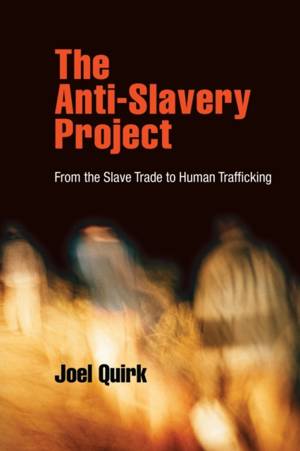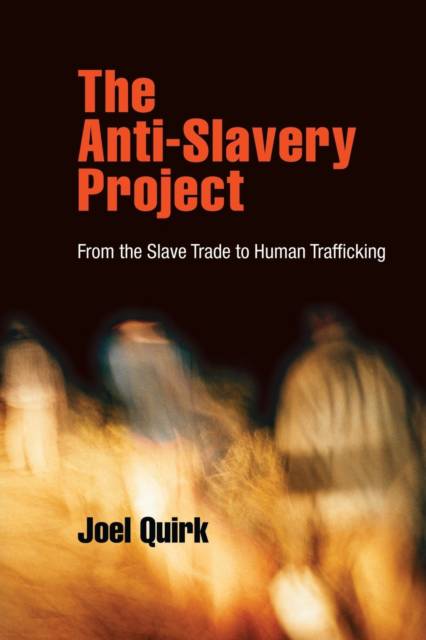
- Retrait gratuit dans votre magasin Club
- 7.000.000 titres dans notre catalogue
- Payer en toute sécurité
- Toujours un magasin près de chez vous
- Retrait gratuit dans votre magasin Club
- 7.000.0000 titres dans notre catalogue
- Payer en toute sécurité
- Toujours un magasin près de chez vous
Description
The Anti-Slavery Project From the Slave Trade to Human Trafficking Joel Quirk "In this excellent exposé of the history of slavery from its legal abolition to contemporary manifestations, Professor Joel Quirk fills a serious gap in the study of this issue and lucidly addresses the inevitable trait-d'union existing between past and present in slavery studies."--Leiden Journal of International Law "Quirk has joined an increasing number of historians who should be applauded for devoting themselves to human rights, and he makes a valuable contribution by linking slavery to contemporary forms of exploitation."--Human Rights Quarterly "The current anti-slavery movement labours under a delusion. The popular notion that some new and monstrous mutation burst upon the world at the end of the twentieth century serves no one well, least of all those in slavery. This original and insightful book helps us to see slavery clearly, both in the past and today. It is very difficult to solve a problem you do not understand, and more so if the problem is called by a different name every generation. The Anti-Slavery Project offers invaluable assistance to modern abolitionists and scholars along the lines of Einstein's dictum: 'Everything should be made as simple as possible, but no simpler.'"--Kevin Bales, President of Free the Slaves "In this path-breaking book, Joel Quirk provides a compelling analysis of the relationship between the global history of slavery and abolition and contemporary forms of human bondage. By focusing upon the limitations--as well as strengths--of the historical abolition movement, The Anti-Slavery Project offers new insights into the enduring yet constantly evolving challenges that have faced slaves, former slaves and other vulnerable groups at many different times and places."--Paul E. Lovejoy, York University It is commonly assumed that slavery came to an end in the nineteenth century. While slavery in the Americas officially ended in 1888, millions of slaves remained in bondage across Africa, Asia, and the Middle East well into the first half of the twentieth century. Wherever laws against slavery were introduced, governments found ways of continuing similar forms of coercion and exploitation, such as forced, bonded, and indentured labor. Every country in the world has now abolished slavery, yet millions of people continue to find themselves subject to contemporary forms of slavery, such as human trafficking, wartime enslavement, and the worst forms of child labor. The Anti-Slavery Project: From the Slave Trade to Human Trafficking offers an innovative study in the attempt to understand and eradicate these ongoing human rights abuses. Joel Quirk is Senior Lecturer of Political Studies at the University of the Witwatersrand. He is author of Unfinished Business: A Comparative Survey of Historical and Contemporary Slavery, and co-editor of several volumes including International Orders in the Early Modern World: Before the Rise of the West. Pennsylvania Studies in Human Rights 2011 344 pages 6 x 9 ISBN 978-0-8122-4333-8 Cloth $65.00s £42.50 ISBN 978-0-8122-2324-8 Paper $29.95s £19.50 ISBN 978-0-8122-0564-0 Ebook $29.95s £19.50 World Rights Law Short copy: Historian and human rights scholar Joel Quirk examines the evolution of political opposition to slavery from the mid-eighteenth century to the present day. He offers an original diagnosis of the underlying causes driving one of the most pressing human rights problems in the world today.
Spécifications
Parties prenantes
- Auteur(s) :
- Editeur:
Contenu
- Nombre de pages :
- 344
- Langue:
- Anglais
- Collection :
Caractéristiques
- EAN:
- 9780812223248
- Date de parution :
- 22-05-14
- Format:
- Livre broché
- Format numérique:
- Trade paperback (VS)
- Dimensions :
- 147 mm x 226 mm
- Poids :
- 498 g

Les avis
Nous publions uniquement les avis qui respectent les conditions requises. Consultez nos conditions pour les avis.






